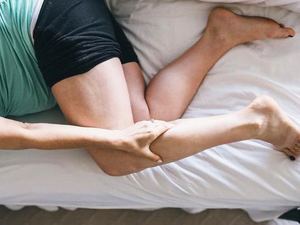Convulsion refers to the involuntary twitching or strong contraction of skeletal muscles in the whole body or in a group of local areas, which can often cause joint movement and stiffness. Sleep tic is manifested as a sudden twitch during sleep, which sometimes wakes the person up, and is a spontaneous twitch.
Epidemiology
Prone populationNo special population
symptom
Typical manifestations
The clinical manifestation is a sudden twitch of the body during sleep, which may be accompanied by a feeling of falling from a high altitude or vague dreams, and sometimes awakening. It is a spontaneous twitch and generally does not affect sleep. However, if the twitch during sleep is too frequent, it can cause periodic limb twitch disorder and eventually cause insomnia.
reason
Overview
The causes of sleep twitching include epilepsy, periodic limb movement disorder, hypocalcemia and hypomagnesemia, excessive mental stress, exercise before bedtime, calcium deficiency, cold, lack of exercise, etc.
Cause of symptoms
1. Disease factors
Certain diseases such as epilepsy, periodic limb movement disorder, hypocalcemia and hypomagnesemia, etc. Among them, hypocalcemia and hypomagnesemia may cause sleep convulsions, which may be accompanied by symptoms such as delirium, muscle fiber tremors, and bilateral hand and foot athetosis.
2. Psychological factors
When a person is under great mental stress, the nerves in the brain are in a tense state, which may cause sleep twitching.
3. Others
If muscles become tense due to exercise or some other reason before going to bed, and the muscles begin to relax after falling asleep, it will cause convulsions; the body loses a large amount of calcium, and calcium deficiency can cause convulsions during sleep; catching a cold, lack of exercise, and poor physical fitness can also cause convulsions during sleep.
Common diseases
Epilepsy, periodic limb movement disorder, hypocalcemia and hypomagnesemia, etc.
Medical treatment
Emergency (120) Indications
1. Sudden and severe convulsions during sleep;
2. Accompanied by eye rolling, clenched teeth, and foaming at the mouth;
3. Accompanied by ankylosis of joints;
4. Accompanied by impaired consciousness;
5. Accompanied by incontinence;
6. Accompanied by high fever and chills;
7. Other emergency situations occur.
In all cases above, you must call the emergency number or go to the emergency room for treatment in time.
Outpatient Indications
1. Repeated convulsions during sleep;
2. The frequency of occurrence has increased significantly recently, and it may even occur every day or multiple times a night;
3. Accompanied by repeated limb cramps, numbness, tingling, etc.;
4. Seriously affect sleep, causing daytime sleepiness, memory loss, etc.;
5. Other severe, persistent or progressive symptoms and signs occur.
All of the above require prompt medical consultation.
DepartmentNeurology, Emergency Department
Medical preparation
1. Make an appointment in advance and bring your ID card, medical insurance card, medical card, etc.
2. If you have had medical treatment recently, please bring relevant medical records, examination reports, test results, etc.
3. If you have taken some medicine to relieve symptoms recently, you can carry the medicine box.
4. Family members can be arranged to accompany the patient to seek medical treatment.
5. Patients can prepare a list of questions they want to ask in advance.
Questions your doctor may ask you
1. How long have you been experiencing this condition?
2. How often do your symptoms occur?
3. Have you ever had convulsions during the day?
4. Do you feel pain after a seizure?
5. In addition to twitching while sleeping, do you have any other discomfort?
6. Have your symptoms gotten worse or better since you became ill? Is there any reason for this?
7. Have you ever had similar symptoms before?
8. Have you ever been treated before? How was it treated? What was the effect?
9. Have you checked your blood calcium and magnesium levels? Are they normal?
10. Do you think there is any reason for your convulsions? Do you do a lot of exercise before going to bed?
11. Do you feel stressed in life recently? Do you feel tired or nervous?
Questions patients can ask their doctors
1. Why do I have convulsions while sleeping?
2. Is the twitching related to my exercise before going to bed?
3. Is my condition serious? Can it be cured?
4. What treatment do I need? Do I need to be hospitalized? How long will it take to recover?
5. Are there any risks with these treatments?
6. If you take medication, what are the usage, dosage, and precautions?
7. What tests do I need to do?
8. I have other diseases. Will this affect my treatment?
9. How should I take care of myself after returning home?
10. Do I need follow-up examinations? How often?

